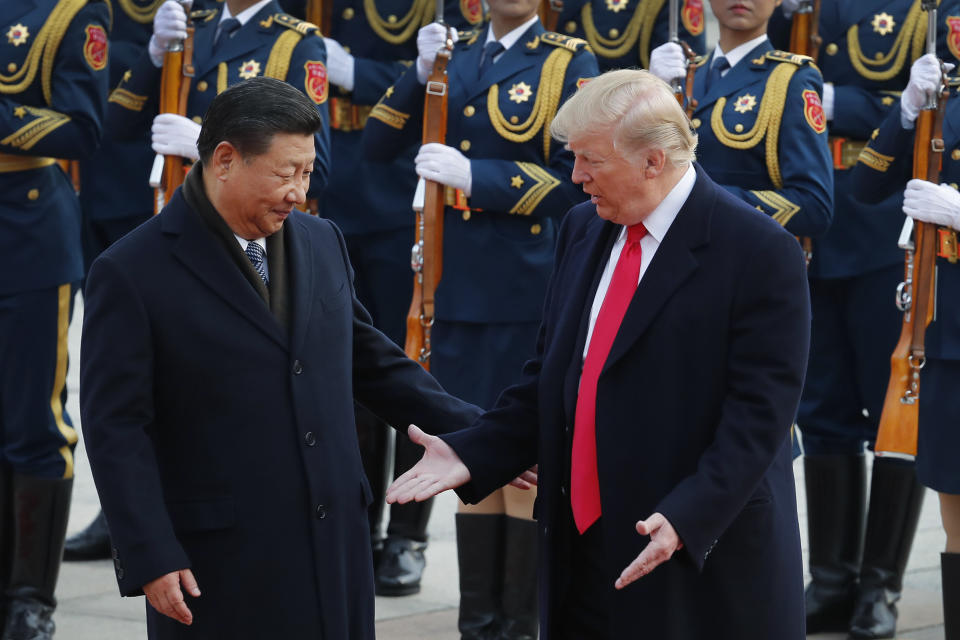Walmart earnings — What you need to know in markets on Thursday
Stocks were little-changed Wednesday after an eventful Tuesday saw stocks decline and rates rise.
On Thursday, investors will get the week’s biggest earnings report in the morning as Walmart (WMT) is set to report results for its first quarter before the market open.
Analysts are expecting the world’s largest retailer to report adjusted earnings per share of $1.12 on revenue of $120.4 billion, according to estimates from Bloomberg. Global same-store sales excluding gas are expected to rise 2.1%, while U.S. same-store sales should rise 2.3% during the quarter.
Investors will also be looking for commentary on the company’s online efforts as Walmart has in recent years stepped up its competition with Amazon (AMZN). Last week, it was announced that Walmart had paid $16 billion for a 77% stake in Indian e-commerce company Flipkart.

Other retailers reporting results Thursday should include J.C. Penney (JCP) and Nordstrom (JWN). On Wednesday, Macy’s (M) was the S&P 500’s biggest gainer, rising more than 10% after reporting results that beat expectations.
And on the economic calendar on Thursday, investors will get manufacturing readings from the Philly Fed as well as the weekly report on initial jobless claims.
Corporate America’s sanguine view on trade
First quarter earnings season is basically over.
And so earlier this week, Goldman Sachs analysts released their quarterly Beige Book giving an overview of what corporate leaders discussed on earnings conference calls this quarter. The report is styled after the Federal Reserve’s report of the same name which collects economic anecdotes from across the country.
As expected, the issue of trade and trade tensions weighing on business sentiment came up during the quarter.

And on balance, corporate America seems largely unconcerned about rising tensions between the U.S. and China on trade escalating into an all-out trade war.
On earnings calls this quarter, executives at companies ranging from DowDuPont (DWDP), Boeing (BA), Intel (INTC), and UPS (UPS) all expressed some optimism about tensions which became a primary worry for markets in March would be resolved.
“Look, I don’t think we’re looking at a major trade war here,” said an executive from DowDuPont.
“I think some of that’s been overplayed. I think what’s going on here is we’re trying to find a path toward fair treatment with trade with all countries, including making sure the IP is protected and making sure that products aren’t being dumped back here in the United States.”
Executives at Boeing — a company that is among those most vulnerable to major business impacts if the U.S.-China trade relationship changes meaningfully — said they were “encouraged” by the dialogue between the two countries. Boeing hosted its earnings conference call on April 25; the trade situation has improved since then.
And on Wednesday, a report from Bloomberg said Peter Navarro, a Trump economic advisor who is a hardliner when it comes to changing the U.S. relationship with China, will be excluded from planned talks on Thursday between U.S. and Chinese leaders.
Axios later reported that Navarro and Treasury Secretary Steven Mnuchin have had a falling out over how the administration has handled discussions with the Chinese.
On the one hand, chaos inside the administration should be seen as a negative sign for financial markets that — we are often told be investors — like stability.
But on the other hand, the more hawkish members of Trump’s economic team getting pushed to the side points to a more likely de-escalation of trade tensions between the U.S. and the world’s second-largest economy. Certainly, markets and American businesses would like this outcome.
And if the Trump administration does indeed back off some of its demands when it comes to trade agreements with China, it seems that based on corporate sentiment during the most recent earnings period investors will once again be proven right when it comes to Trump. Which is that, in general, the president will hew towards outcomes that are better for business and better for the stock market. This was the one-way bet most investors made in 2017, and despite the middling performance of the stock market this year, appears to still be the prevailing wisdom in markets.
—
Myles Udland is a writer at Yahoo Finance. Follow him on Twitter @MylesUdland


